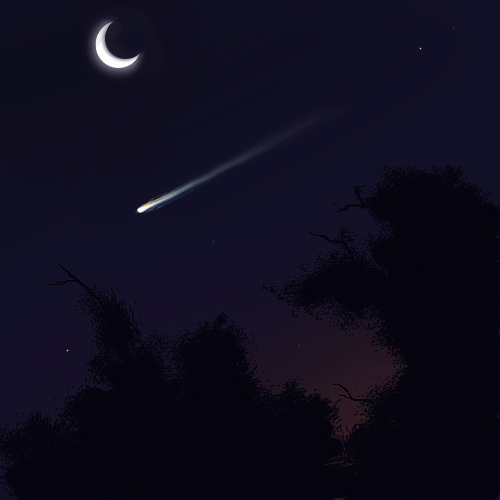
Of Stars and Satellites
Words By Marie Eljera, Art By Ellen Everett
It was a satellite that Peter saw in the sky that night. Peter was a bright kid, so it wasn’t difficult for him to make the connection. The story was all over the news, and while most other ten-year-olds he knew would never waste their time with such boring grown-up stuff, let alone understand what was being broadcast, Peter followed the commentary with perfect apprehension.
The satellite had an acronym for a name and embodied a culmination in scientific progress. It orbited the planet at incredible speed, thousands of miles from the Earth’s surface, its reflection visible to the naked eye and yet indistinguishable amongst its neighbors in the night sky. From this perspective, it provided scientists back on Earth a better understanding of gravity, a force, like time, recognizable solely by its influence.
However, after years of dedicated service to mankind, the satellite’s battery had simply run out, reducing it to a 2,000 pound hunk of space debris. It took three weeks for the satellite to fall out of orbit and re-enter the Earth’s atmosphere, where its sheer speed set the air around it ablaze. Ignited, it scorched a trail across the night sky, exploding finally into a million shards of radiance, as brilliant in death as it was in conception.
The night Peter saw the light in the sky, he was sitting in the back seat of the car. His dad had one hand on the steering wheel and the other on Peter’s mom’s pregnant belly. Peter was worried because his dad was driving way too fast, and his mom was crying. They were rushing to the hospital, so Peter knew something was wrong. For all his questions, his dad would give the same response, “It’s too early.” Despite being considered mature for his age, Peter wasn’t quite sure what that meant.
So, when Peter saw the sudden streak of brightness cut across the dark horizon, he thought it was a shooting star. Any ten-year-old, no matter how smart, in the same situation as Peter found himself, would make a wish, and that’s what Peter did. He wished with all his heart and knew, somehow, that the light he had seen came from a place that could grant it.
Sitting in the hospital room days later, Peter watched the news. It didn’t escape him that what he thought was a star actually wasn’t. It was something man-made, constructed of metal and microchips. Sitting beside his newborn sister, Peter came to a deeper appreciation of gravity’s effect on weight, and waiting. As an old man, Peter will tell this story to his grandchildren—how he had witnessed the death of one thing and the birth of another on the same night. He will tell them why each time he glimpses a shooting star, he imagines it to be a falling satellite, but never fails to make a wish.